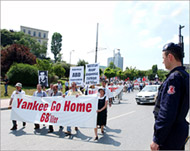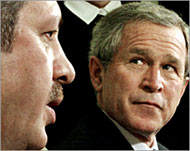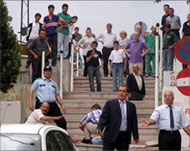Turks chafe under security restrictions
With Istanbul witnessing the largest security operation in its history in the lead-up to the NATO conference starting on Monday, world leaders in attendance should feel more secure.

The city’s residents, however, are far from happy. And now, it seems, even the picture of foolproof security may be deceptive.
At least three people were killed and eight others injured in a bomb explosion which ripped through a bus in Istanbul on Thursday.
The bus was passing in front of a hospital in a residential district of Turkey’s largest city when the blast occurred on Thursday.
Hours earlier, two Turkish police officers were injured in a blast near a hotel in the capital, Ankara, where US President George Bush is expected to stay overnight on Saturday.
Bush is due to arrive in Ankara on Saturday for talks with Turkish officials on Sunday before travelling on to Istanbul for the two-day NATO summit.
‘Rambo cops’
Even before Thursday’s incidents, some 20,000 extra police had been drafted in to provide security and counter expected demonstrations while virtually sealing off the city’s conference and hotel district.
Additionally, according to the semi-official Anatolian News Agency, some 500 anti-terrorism specialists and 600 “Rambo cops” – special operations police – have been deployed, along with a Response Team paramilitary police whose strength is estimated at between 800 and 2000.
 |
|
Public opinion strongly opposed a |
Meanwhile, some 400 extra squad cars have been brought in, 3000 suits, shirts and ties bought for extra plainclothes police, and a $360,000 emergency-expenses fund set up. Civil-defence teams and nuclear, chemical and biological warfare squads have also been deployed in an operation said by Anatolian to be costing around
$20 million.
Yet while the operation may protect the 3,000 official delegates, it may not be doing much for the locals, according to human-rights groups.
“Although we don’t have exact figures, in the last 10 days many people have been taken from their homes and workplaces for questioning,” Hurriyet Sener of the Turkish Human Rights Association (IHD) told Aljazeera.net.
Pre-emptive arrests
IHD said around 22,000 city residents have had security checks carried out on them in advance of the conference, while Kurdish, leftist and Islamist groups and publishing houses have been raided.
“We saw the police turn up at the Dicile News Agency,” said a journalist working for the leftist newspaper Evrensel, which has offices opposite the pro-Kurdish Dicile. “We went to do a story and saw the police taking the people who work there away in groups of six.”
|
“In the last 10 days many people have been taken from their homes and workplaces for questioning” Hurriyet Sener, |
There are also widespread allegations of detentions in Kurdish and Alevi districts of the city. Istanbul’s Alevi (also called Alouwite) community is traditionally leftist.
“The same day the police raided the Dicile News Agency, they also raided the Okmeydani Cultural Centre,” said Sener, adding that in one day nine different places were visited by the police anti-terrorism squads. Okmeydani is a poor neighbourhood with a mixed Kurdish, Alevi and Turkish population located not far from the conference venue.
With both President Bush and British Prime Minister Tony Blair expected to attend the Istanbul summit, security has been extra tight – especially given their role in the Iraq war and the widespread opposition in Turkey to the invasion.
“The NATO summit is an attempt to legalise the US invasion of Afghanistan and Iraq,” says Yildiz Onen, spokeswoman for the Global Peace and Justice Coalition, which is coordinating protests against the summit.
“Ninety-five percent of people in Turkey were against the war led by these people [the NATO leaders], and for this reason, we can’t accept them coming here.
“Actually, if we are talking about security, it is the people who have to be protected from these leaders, not the other way around,” Onen said.
Street protests
There is also a widespread expectation that the summit will see pressure on Turkey from the US and UK to assume a bigger role in Iraq – something the government has so far resisted.
Last year, before the Iraq invasion, Turkey’s parliament voted against allowing US troops to use Turkish bases to attack Iraq. Back then, most opinion polls showed almost unanimous hostility to any Turkish involvement in the war.
 |
|
Bush will meet Turkish leaders in |
“We want our government to behave with honesty and honour,” said Hulya Sekerci of the Muslim Free Thought and Educational Rights Society, which is also organising protests against the summit.
“We don’t want to be a subcontractor for the US. Turkey has always had a strong feeling of being pro-American, which is not easy to break, but we want Turkey to be able to get out of that devil’s triangle between Israel, US and UK – to have a policy outside that triangle.”
Already, Istanbul has seen protest activities ranging from rock shows and street theatre to small demonstrations and press declarations.
The city has a long history of such protests, as members of the 1968 Association reminded residents on Monday. They held a march commemorating a 1968 demonstration against the arrival of the US Sixth Fleet in the city, in which one protester was killed by police.
Restrictions
The authorities dismiss the opposition to the NATO summit as insignificant. “These are marginal groups exercising their democratic rights,” Prime Minister Recip Tayyip Erdogan said on Tuesday of the protests.
Demonstrations have been restricted to two specific areas of this giant city of 12 million, causing protest groups to complain that both of these spots are difficult to get to and very far from the conference venue.
|
“The NATO summit is Yildiz Onen, |
“The authorities have set aside places where we can protest,” says Sener of IHD. “But in practice, there are big limitations on this. They are places no one can get to, and, besides, they have placed a limit on the number who can gather.”
The security operation also means some 184 streets, roads and boulevards, from the city airport to the Bosphorus, have been partly closed to traffic. The result, many residents fear, will be colossal tailbacks.
“With traffic paralysed, there is a situation in which even if people want to attend protests, how will they get there?” asks Sener.
Inconveniences
As protesters from Turkey and around the world gather to make their point, it may be that Istanbul residents’ feelings towards the summit are swayed more by the inconveniences of the security operation than any wider political arguments.
 |
|
Thursday’s bomb blasts exposed |
“I just want it to be all over and them all to go home so we can get out of our houses and not spend all day trying to go somewhere,” said Mustafa Dirice, a resident of the Tesvikiye district, located bang in the middle of the summit’s security zone.
But Istanbul police authorities argue that these measures are necessary given the nature of the conference and heightened security fears. Istanbul Security Department’s Celattin Cerrah said: “During the summit, we will take whatever security measures are necessary to ensure there are no disturbances.”
After Thursday’s blasts, one thing is certain: Istanbul and Ankara’s already tight security will only get tighter.